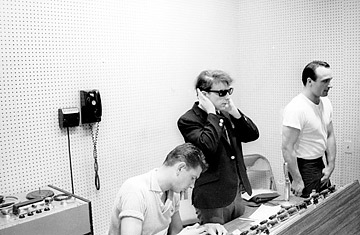
Phil Spector in a Los Angeles studio, 1963
(2 of 2)
The teenage Phil Spector could have used a Phil Spector single to cheer him. He was born in the Bronx, in 1949, and bred in violence. His father Benjamin, whom Phil commemorated in his first hit "To Know Him Is to Love Him," killed himself when the boy was 9. (Spector in the film: "I mean, when your father blows his head open, it's not funny. And it leaves a scar on you.") Phil's mom, after whom he named his Mother Bertha music publishing company, is depicted as wildly unstable; Brown's biography includes a vignette from when Phil was about 20 and "Bertha chased her son around the apartment, brandishing a kitchen knife." He and his friend Russ Titelman ran out and jumped into Phil's Corvette. "We get in," Titelman told Mick Brown, "and suddenly Bertha is standing at the end of the alley with a piece of four-by-two, screaming at the top of her lungs at him. Phil starts inching the car toward her — he just kept on going, and she got out of the way.... I have no idea what they were fighting about."
By this time "To Know Him Is to Love Him" had gone to No. 1, with Spector's trio The Teddy Bears, and he had become a protégé of top writer-producers Jerry Leiber and Mike Stoller. (Spector composed the plangent melody for Leiber's "Spanish Harlem.") But what he really wanted to do was produce. With his first hit group, the Paris Sisters, he extended the Teddy Bears' wistful ballad style. Then he did a 180, dove into the raucous girl-group genre and started creating masterpieces. The Wall of Sound had antecedents in numbers like U.S. Bonds' "Quarter to Three" and some of the early Motown hits; their spontaneous mood and dirty aural tracks were what Spector worked up a sweat trying to reproduce and transcend. Thus he made art, and top-10 hits.
In 1965 Tom Wolfe proclaimed him "The First Tycoon of Teen" in the Herald Tribune's Sunday magazine New York, and Spector considered himself the cock of rock; as he tells Jayanti, "I could strut sitting down, I was so brazen." But his girl-group hitmaking days were over; he needed some galvanizing performer to sell his next single. As he tells Jayanti, "I just wanted an act that could become famous so I could make a hit record, that could go on to Las Vegas and The Ed Sullivan Show and destroy the Beatles." He thought he found that act in Ike and Tina Turner, the stud bandleader and his feral wife, who were an R&B sensation but hadn't found mainstream success. The 1966 "River Deep — Mountain High," which blends pre-teen lyrics about rag dolls and puppies to Tina's rampaging womanliness, and encases her screams and shouts in a propulsive symphonic arrangement, was to be their breakthrough and Spector's return to the top of the pops. But it flopped on AM radio, and in frustration he stopped producing until the Beatles begged him to get back.
In his 2007 interview with Jayanti, which was taped between the trial that ended in a hung jury and the later one that resulted in his conviction, Spector — his gray eyes intent, like a slightly sedated Gilbert Gottfried, his clasped hands trembling — was still his biggest fan; the license plate on his black Mercedes reads "I ♥ PHIL." And he still felt the world has insufficiently appreciated his achievement: "I'm concerned with the fact that I have not been made a doctorate at any college, and Bill Cosby has. Even Dylan has." He harbored a special grudge against Tony Bennett (Tony Bennett??) and tells a long story about how Martin Scorsese didn't pay for the rights to "Be My Baby," used in the first scene of his 1973 breakthrough movie Mean Streets. (Scorsese told me back then that he paid $15,000 for the song.)
Spector sees the trial as "this thing that happened to me," another traumatic episode like his father's suicide, his mother's threats. He sees himself as a victim of the crime he committed. The strangest scene in the movie shows Spector in court, instructed to hold his hand out like a gun in a recreation of the night of Clarkson's death. It's as if he's posing for the Tussaud Museum wax figure of course — another tribute he will never get.
"I may not believe in God," Spector tells Jayanti, "but I know there's a Devil." The viewer is left with the challenge of reconciling this strange, violent, broken man, now 70, with the majestic rock 'n roll joy he produced nearly a half-century ago.
